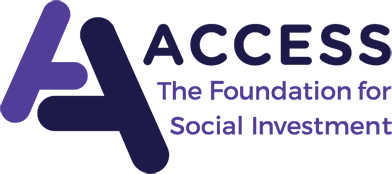Access’ Approach to Learning
Access has a clear & detailed strategic plan for 2018-23. This strategic plan, alongside our Theory of Change (see below), set out what Access wants to achieve over a five year period:
The aim of Access’ Learning function is to support Access in testing whether and in what ways we are achieving these aims and to help Access respond to the learning within our programme delivery to best achieve those aims.
Access’s strategic plan outlines what we want to achieve as a learning organisation over the five year period:
We will listen to the changing needs of charities and social enterprises; extract as much knowledge as possible from our programmes and that of others; make that knowledge available in a way that is useful for charities and social enterprises; and influence key actors in the social investment sector and beyond.
There are three core strands that we are pursuing through Access’ learning work
- Understanding the needs of charities and social enterprises and ensuring we are meeting those needs: Access seeks to listen to the needs of charities and social enterprises and be responsive to these through our programme delivery.
- Delivering impact through Access’ programmes and learning from our findings to maximise that impact: Access seeks to deliver impact over its lifetime through its programme delivery – using developmental monitoring and evaluation to learn and adapt over time.
- Embedding our learning beyond Access: Access seeks to be part of a movement across the sector to address shared challenges and propose common solutions by convening around the lessons learned.
Access has appointed the TI Group as a learning partner.
Measures of Success
Access’ 11 Measures of Success help us to understand how we’re doing on the journey towards achieving those goals. They help us to gauge if we are having the intended impact across our programmes of work.
Measures 1-9 relate to Access’ direct impact. Whilst we may only be one of many actors contributing towards changes in these nine areas – we still hold ourselves to account in terms of achieving positive impact.
Measures 10 and 11 sit beyond Access’ “line of accountability”. The purpose of our work is to lead to changes in these areas eventually down the line, so it is important to represent them here. Access does not however hold ourselves to account or routinely measure how we are impacting on these measures. That is because they are too far removed from our delivery for us to claim any direct role in their achievement and there are too many other factors at play influencing the outcomes (i.e. Access’ attribution is too far removed). However we do want to test the relationship between our more tangible impact and these longer term changes.
Data Collection
We work with our partners to collect the right data to evidence and assess progress against the Measures of Success. Access’ philosophy is to measure the minimum and measure it well.
Our data collection includes:
|
Routine Monitoring Access has built effective systems to monitor and gather insight across its programmes. We are striving to adopt a more consistent approach to monitoring key measures of success across our programmes. This is to allow for comparative and cross-programme learning. In 2020-21:
|
Programme Level Evaluations In addition to routine monitoring, Access undertakes, commissions and supports a range of evaluations across our programmes. In 2020-21:
|
|
Commissioned Research and Research Grants Access commissions or awards research grants to plug the gaps in our learning that cannot be answered through our routine monitoring or programme level evaluations. These pieces relate to the three core strands of our learning work (responding to needs; maximising impact; and embedding learning). In 2020-21:
|
|











